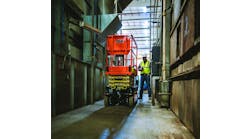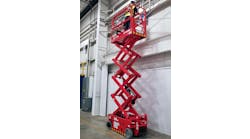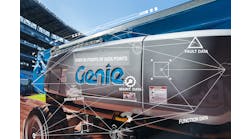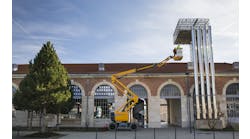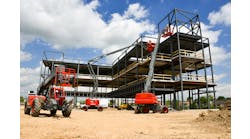In his annual predictions for RER, rental industry consultant Dan Kaplan talks about what to expect in what he calls the most difficult year in the past 50 years of the rental industry.
RER: What are your expectations for the rental market in 2009?
Kaplan: I expect 2009 to be the most difficult year in the last 50 years of the rental industry. Fleet sizes will decline from 5 to 10 percent; rental rates will decline 3 to 5 percent; capex spending will be slashed and the size of the rental industry in North America will decline in excess of 5 percent. Everyone will feel the effects — independents, the large rental companies and the manufacturers. The pain will be disproportionate. The manufacturers will experience the most pain; they have capacity to serve a rental industry that has purchased significant quantities of equipment these past four years. Second in line to feel the pain are the top rentals companies; their fleets are at record levels, capable of supporting an economy that enjoyed record non-residential spending. Last in line are the independents; they will feel the pain but to a much lesser extent than the top rental companies or the manufacturers; their fleets have grown minimally.
How should rental companies manage their fleet during times of decreased demand?
There are two answers to this question: Independent rental companies or top 10 rental companies. The key in both cases is to maximize time utilization and eliminate under-performing fleet.
Top 10 rental companies enjoy time utilizations that range from percentages in the low 60s to the low 70s, with dollar utilizations ranging from the mid-40s to the low 60s. Independents experience time utilizations below 50 percent with dollar utilizations ranging from the low 70s to well over 100 percent.
The fundamentals of managing a rental fleet are the same for good times or bad times. Rental-specific software is critical to managing a fleet. Fleet must be managed asset by asset. Broadly speaking, I recommend utilizing the ROI grid below. If you follow these recommendations, you will be utilizing the fundamentals of good fleet and rate management.
ROI Grid
High time utilization; high ROI
Strategy: Raise rental rates. Buy more equipment.
Low time utilization; high ROI
Maintain or raise rental rates incrementally. Do not buy any more assets; transfer or delete.
High time utilization; low ROI
Strategy: Look for repair problem; if not a repair problem, buy more equipment and raise rental rates.
Low time utilization; low ROI
Strategy: Lower rental rates; transfer or delete equipment.
What are some of the ways you would suggest rental companies improve efficiencies during the coming month? For example, centralized or otherwise improved dispatch systems; improved buying practices; more sophisticated software? Obviously every company is different but what are some of your suggestions?
Every expenditure must make a contribution — equipment, people, branches, districts, regions, as well as corporate overhead support staff — or be eliminated. Rental software is critical to manage and evaluate the fleet. What I am saying is unemotionally evaluate every aspect of the business and take actions to reduce costs where indicated.
Managing labor is a bit of a vicious circle for rental companies. During boom times, good people are hard to find. Then, companies finally find the professional-level help they need and when a downturn comes they downsize staff and let go some of the very people they searched so hard for. What are some of your suggestions about how to deal with this problem?
This is perhaps the most difficult issue for a rental company, or for any company. People are the critical factor for any company. Survival is also critical. I cannot offer any suggestions that are rental specific. Good business sense must be followed. Minimize overtime, freeze salaries, eliminate 401K matches, reduce the work week and if necessary reduce staffing. These are the most difficult times that will require the most difficult decisions.
Most rental companies are aging their fleets at this time. For those that have real replacement needs, what do you suggest to them? For those that will shop at the ARA convention, what are some of the thoughts you suggest they keep in mind?
There are two different paths here. The large rental companies with fleet levels above $300 million and the independents with fleet levels below $1 million. The top rental company’s fleet age has gone dramatically up and down over the past eight years. From the high twenties (months) to the high forties (months) and back down again. 2009 will see significant aging of the larger fleets. In 2009 we will see some maintenance capex; but at a reduced level versus prior years. Large rental companies compete against each other on fleet age. So, fleet age is important from a competition point of view aside from maintenance costs.
There is a third group consisting of about 80 to 90 companies, about 40 of which are dealers, whose fleet sizes rank between $10 million and $300 million. These companies are competing with major rental companies, servicing the same customers regionally and locally. What they need to do is be aware of fleet age, and in my opinion they need The Rental Show to shop for their requirements, except for those who are heavily influenced by the manufacturer they are dealers for. Of those 40 dealers, more than 20 are Cat dealers, so to the extent they need equipment other than what they obtain from the manufacturers they represent, they need The Rental Show to source products and keep their fleet competitive.
The major rental companies utilize The Rental Show as a networking opportunity. The independents utilize The Rental Show as a buying opportunity. Independents, in my opinion, do not compete against each other on fleet age. My advice for an independent is manage your business. If the fleet is old and is costly to maintain — buy. If you are in a strong marketplace —buy.
Is now a good time to sell a rental business? What advice would you give those that are considering doing so?
2009 is a bad time to sell a rental business and, at the same time, a good time to acquire a rental business. Rental companies sell for a multiple of EBITDA. The EBITDA multiples will be low in 2009, and the absolute earnings of the rental companies will be reduced versus prior years. My advice is to wait, if possible. Conversely, what a time to buy a rental business!
What advice would you give those seeking to buy a rental company?
The answer to this question revolves around the ability to fund an acquisition or expand the business. Obtaining funding in 2009 for an acquisition or expansion will be next to impossible. I would not recommend expansion in 2009; I recommend cost reduction. On the other hand if a large platform business was available and funding was possible, I would be all for it.
What about people considering entering the rental market for the first time, by buying or starting up a rental business? Should they be intimidated and scared away because of the current downturn?
I do not believe that 2009 is the right time to enter a rental business for the first time. I would much prefer buying a business for the right price versus a cold start. It will take the most sophisticated and experienced operators to prosper in 2009.
Do you expect to see much consolidation in the rental business during the next year or two?
I do expect to see consolidation of the top 10 rental companies in the next two years. In my opinion, it is more a certainty then an expectation. The top five rental companies today have a market share of 19 percent; the top 10 rental companies have a share of 23 percent. United Rentals, the largest rental company in the world, has a market share of 6.6 percent. I expect to see the largest rental company market share in North America to be in the teens in the next few years. Yes, more consolidation.
Do you expect to see much consolidation among manufacturers during the next year or two?
For sure there will be more consolidation among the manufacturers. Look at what Terex and JCB have accomplished over the past years. Expect more of the same. As I have been predicting for many years I expect to see manufacturers buying into the rental channel (acquiring a rental company) to have distribution for their product and compete with Caterpillar, which owns its own rental channel through CAT Rental Services with more than 1,400 stand-alone rental branches globally.
